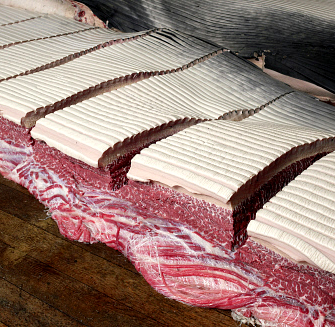Fin whale kills criticised

Despite dwindling demand for whale meat and significant international opposition, Japan’s Fisheries Agency has sanctioned Kyodo Senpaku, the country’s last remaining whaling company, to hunt up to 59 fin whales in the North Pacific this year.
This decision follows the recommendations of a pro-whaling committee, and adds to Japan’s existing quotas for sei, Bryde’s, and minke whales.
This move has been met with widespread criticism from conservation groups and governments.
“It perpetuates a vicious economic cycle that Japan needs to break: Kyodo Senpaku can’t sell the whale meat it already has. Nevertheless, the company keeps asking the government for higher quotas and more financial support in hopes that miraculously rebounding meat sales will offset its mounting debts,” says Sue Fisher, a senior policy advisor at the Animal Welfare Institute (AWI).
In parallel, Iceland has also resumed commercial whaling, with the government permitting Hvalur hf, its last remaining whaling company, to kill up to 128 fin whales.
This decision, too, has been heavily criticised, particularly given Iceland's own unsold stockpile of 2,000 tonnes of fin whale meat in Japanese storage facilities.
“This determination condemns more than 100 whales to a cruel, unnecessary death, despite overwhelming video evidence from Iceland’s Food and Veterinary Authority that whaling cannot be conducted in a humane manner,” said Kate O’Connell, AWI’s senior policy consultant.
Both countries' quotas were not approved by the International Whaling Commission (IWC), the global body responsible for whale conservation.
Japan left the IWC in 2019 and has since resumed commercial whaling independently, a move that has further strained international relations and conservation efforts.
In Japan, the Kangei Maru, a new factory ship costing ¥7.5 billion (AU$76.5 million), will be at the forefront of the fin whale hunt.
This ship, funded through government loans, represents a significant financial burden for Kyodo Senpaku.
Fisher warned of the looming financial crisis facing the company, saying; “Kyodo Senpaku now faces a financial time bomb of ongoing storage costs for its massive glut of whale meat, along with public and private loan repayments associated with purchasing whale meat from Iceland and building the new mothership. Slaughtering fin whales now makes no financial sense”.
Australia’s Environment Minister, Tanya Plibersek, has expressed deep disappointment, reiterating Australia's opposition to all forms of commercial whaling.
As Japan and Iceland proceed with their controversial hunts, the future of fin whales remains uncertain.








 Print
Print